World
Marianne Williamson on her US presidential campaign, the economy and Gaza
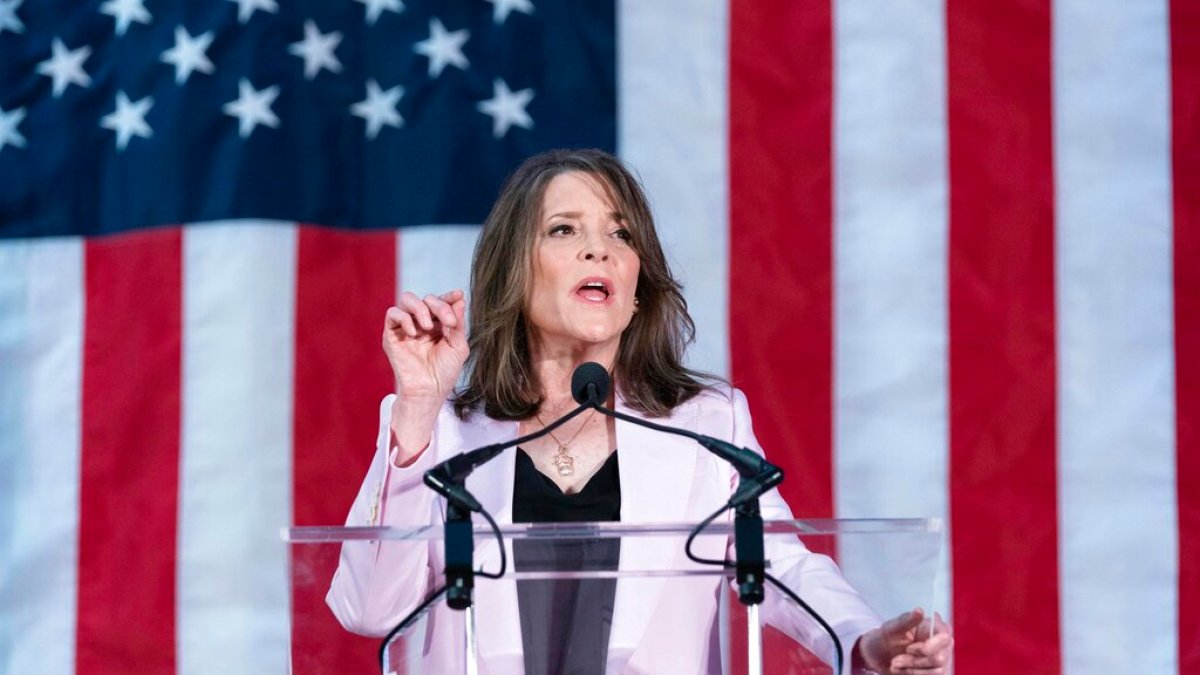
Washington, DC – Marianne Williamson says she is not merely running a protest campaign.
A spiritual author who is challenging President Joe Biden for the Democratic nomination in the 2024 presidential race, Williamson believes someone needs to stand up to the growing corporate influences in the United States government.
“And I’m not the kind of woman who keeps my mouth shut,” Williamson told Al Jazeera from her apartment in Washington, DC, earlier this month.
Only once in US history has an elected president not received his party’s nomination for a second term. That makes Williamson’s campaign a long shot. But she remains undeterred. Her campaign is one of two Democratic challenges seeking to thwart Biden’s nomination, amid drooping poll numbers for the incumbent president.
While the other Democratic contender, Dean Phillips, is running from a centrist platform, Williamson hopes to rally progressives, a growing force in the party.
With her voice rising at times in indignation, Williamson decried how corporate greed was shifting the country — and the Democratic Party — away from their long-held ideals.
“We are at a point now where short-term profit maximisation for huge corporate entities has become America’s bottom line,” she said.
“And that corporatist perspective supersedes democratic values, humanitarian values and the safety and the health and the wellbeing of the American people.”
A progressive challenger
Her 2024 platform echoes many of the Democratic priorities articulated by Senator Bernie Sanders, one of the country’s most recognisable progressive voices.
He ran for president twice, in the 2016 and 2020 races, facing Williamson herself in the latter. She eventually dropped out, endorsing Sanders instead.
Williamson rose to fame in the early 1990s with her best-selling book A Return to Love and appearances on a TV talk show hosted by Oprah Winfrey. Later, in 2014, she unsuccessfully ran for Congress as an independent in California.
But with her presidential platform, she hopes to push further than Sanders did on several policy issues.
For example, Williamson backs a universal healthcare system, but her plan emphasises the need for healthier food, water and air and a less stressful lifestyle, saying that the current economic system increases “the probability of sickness”.
The candidate also wants to create a Department of Peace to suppress violence and address its root causes domestically and internationally.
Williamson’s almost holistic policy approach is underscored by her soft-spoken, guru-like persona. The author’s spirituality has led some to dismiss her candidacy as unserious. She went viral, for example, after saying in a 2019 primary debate that she would “harness love” to beat then-President Donald Trump and his campaign of “fear”.
Williamson is not unaware of that reputation. She acknowledges that she made “silly” statements at the debate that she credits to being “nervous”.
However, Williamson said there was a deliberate push to cast her aside in the 2020 race — a campaign that she said has intensified this time around.
“This time, it’s a full-on assault: mischaracterisation of my personality, of what I’ve done with my life for the last 40 years. This is strategised. This is purposeful,” she told Al Jazeera.
Shortly after Williamson announced her candidacy in March, Politico published an article citing anonymous former staffers who described the candidate as “abusive”. She dismissed the story at the time as a “hit piece” and refuted its details.
And on Wednesday, Williamson’s campaign faced another setback when the Massachusetts Democratic Party submitted only Biden’s name for the state’s primary ballot, effectively excluding her from the list of Democratic candidates.
‘There is no wiggle room’
Still, Williamson has drawn some, albeit limited, momentum. A Quinnipiac University poll last month showed her polling at 12 percent, far behind Biden at 74 percent.
The progressive monthly The Nation, however, noted last month that the polling gap between Williamson and Biden is similar to the margin between Republican rivals Trump and Nikki Haley — though less attention is being paid to the Democratic race.
While the gap is nevertheless huge, Williamson argues that she deserves more media attention, especially with some polls showing Biden trailing Trump in the general elections.
For his part, Biden has waved aside the polling data. “Everybody running for reelection in this time has been in the same position. There’s nothing new about that,” he said when asked about his low approval ratings earlier this year.
Instead, Biden and his allies have hoped to redirect attention to the US economy, which is showing faster-than-expected growth, low unemployment and inflation slowly coming under control.
But Williamson said the oft-cited economic data does not tell the whole story. For example, she pointed to a recent study showing that 62 percent of Americans live paycheck to paycheck.
She also stressed the high cost of living many Americans face, which she said is due to cyclical inflation as well as corporate price-gouging.
“For millions of people, it could be the difference whether or not you keep your apartment,” Williamson said. “So for the majority of Americans, there is no wiggle room.”
On Gaza
Democratic voters are also split over the Biden administration’s support for the war in Gaza. Biden has expressed “unwavering support” to Israel, promising to provide it with billions of dollars of additional aid despite humanitarian concerns over its military campaign.
The Israeli offensive has killed more than 20,000 Palestinians, and Israel’s leaders have pledged to continue the war until Hamas is eliminated. The Palestinian group had attacked Israel on October 7, killing 1,200 Israelis and taking hundreds more captive.
The White House and Pentagon have said repeatedly that they are not drawing any “red lines” to limit what Israel can do with US aid. Biden, meanwhile, continues to dismiss growing calls for a ceasefire.
For her part, Williamson has called for an end to the fighting, the release of the Israeli captives and an international push for a broader resolution of the Palestinian-Israeli conflict.
“I understand Israel’s need to slay the monster. But this military action is only feeding it,” Williamson said. “There was never a military solution here. And there is not a military solution now.”
Williamson added that while there is “no minimisation of the horror and the barbarism and the pure evil of October 7”, Palestinians have been suffering from Israeli occupation, settlement expansion and blockades around their territory.
“I don’t see any solution here but a ceasefire, a release of hostages, architecture for a two-state solution immediately,” she told Al Jazeera. “The death of a Palestinian child is no less horrifying than the death of an Israeli child.”
Williamson’s position reflects the views of a majority of Democrats. A December poll from the New York Times and Siena College found 64 percent of Democratic voters felt Israel should stop its military campaign to prevent civilian casualties, even if Hamas had not been “eliminated”.
But Williamson blames outdated worldviews for policymakers’ opposition to a ceasefire.
“The president is stuck in the 20th century — not just on this, but on many things. And that’s the problem here,” she said.
Biden has been a staunch supporter of Israel throughout his decades-long political career, which stretches back to the 1970s — a time when the country was seen as an essential US ally in the Middle East during the Cold War.
In fact, the president has repeated the same pro-Israel statements verbatim for the past 40 years.
That stance has led many Arab and Muslim Americans to pledge not to vote for Biden in the upcoming election because of his support for the war. So what is Williamson’s message to those voters?
“I have a very difficult time saying anyone should vote for me,” she said. “People should vote their conscience. People should listen to what the candidates have to say, consider deeply within their own hearts and minds what they think is best for their country and the world, and then should vote accordingly.”
Asked about the US vetoing a United Nations Security Council resolution that called for a ceasefire and the captives’ release, Williamson said: “Shameful. Shameful.”
The Democratic primaries kick off on January 23 in New Hampshire.

World
Eight Takeaways: How Israel Weakened Civilian Protections When Bombing Gaza

An investigation by The New York Times has found that Israel, in the weeks after Hamas’s Oct. 7 attack, severely undermined its system of safeguards to make it easier to strike Gaza, and used flawed methods to find targets and assess the risk to civilians.
The Israeli military acknowledged changes to its rules of engagement but said they were made in the context of an unprecedented military threat and always complied with the laws of war.
Here are some of the main takeaways from the investigation.
Raised threshold of civilian harm per pre-emptive strike
In previous conflicts with Hamas, Israeli officers were usually only allowed to endanger fewer than 10 civilians in a given strike. In many cases the limit was five, or even zero.
At the start of this war, the Israeli military increased that threshold to 20, before reducing it in certain contexts a month later. Strikes that could harm more than 100 civilians would also be permitted on a case-by-case basis.
Expanded list of targets
Israel vastly increased the number of military targets that it proactively sought to strike. Officers could now pursue not only the smaller pool of senior Hamas commanders, arms depots and rocket launchers that were the focus of earlier campaigns, but also thousands of low-ranking fighters as well as those indirectly involved in military matters.
Removed limits on how many civilians could be put at risk each day
The military leadership briefly ordered that its forces could cumulatively risk killing up to 500 civilians a day in preplanned strikes. Two days later, even this limit was lifted, allowing officers to conduct as many strikes as they deemed lawful.
Struck too fast to vet all targets properly
The pace of the bombing campaign was one of the most intense in 21st-century warfare, which officers said made it far harder to vet targets properly. Israel dropped or fired nearly 30,000 munitions into Gaza in the first seven weeks, at least 30 times more than the U.S.-led coalition fired in the first seven weeks of its bombing campaign against ISIS.
Used a simplistic risk assessment
Israel often used a simplistic statistical model to assess the risk of civilian harm: It regularly estimated the number of civilians in a building where a target was believed to be hiding by using a formula based largely on the level of cellphone usage in the surrounding neighborhood.
Dropped large, inaccurate bombs
In previous wars, the air force would often use a “roof knock,” a smaller munition to give civilians some time to flee an imminent attack. From the first day of this war, Israel significantly reduced its use of roof knocks. The military also sometimes used less-accurate “dumb bombs,” as well as 2,000-pound bombs.
Used AI to propose targets
Israel used an artificial intelligence system in a widespread way for the first time. It helped officers analyze and sign off on targets exponentially more quickly, increasing the number of targets that officers could propose each day.
Delayed strikes
Hours often passed between when an officer vetted a target and when the air force launched a strike at him. This meant strikes often relied on outdated intelligence.
World
Incoming Trump admin, Congress showdown looms with South Africa over support for Russia, US foes
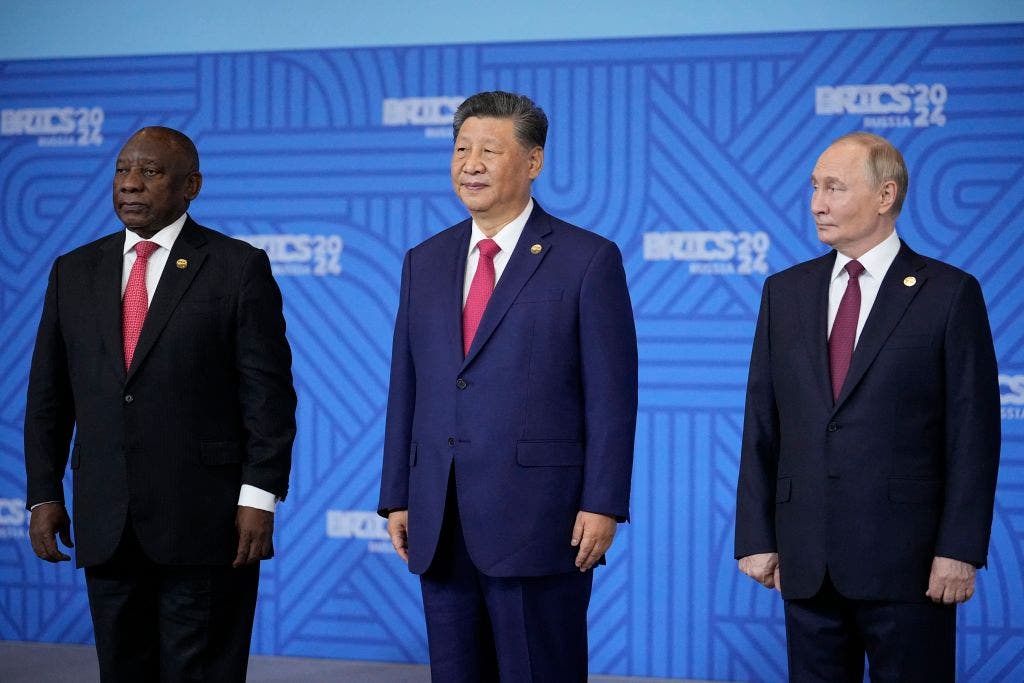
JOHANNESBURG – Key Republicans are already pressing the incoming Trump administration to kick South Africa out of lucrative trade arrangements, should the South African government not change its position on Russia, China, Iran and Israel.
Most at risk is South Africa’s duty-free exports to the U.S. of items such as cars and citrus fruit under AGOA – the African Growth and Opportunity Act, and with it the potential loss of tens of thousands of African jobs. South Africa is likely to be under intense scrutiny from the incoming administration.
A publication from the Center for African Studies at Howard University, in 2023, warned that a country wanting AGOA’s preferential trade agreements “cannot act in a manner that undermines U.S. national security or foreign policy interests”.
South Africa joins Russia’s military aircraft and naval vessels on exercises, allowing Pretoria’s naval bases to be used by the Kremlin and Russia’s sanctioned warships. Senior South African military officials have received training in Moscow. At the U.N., South Africa has refused to condemn Russia’s invasion of Ukraine.
BIDEN TRAVELS TO AFRICA WHERE POLICIES WERE ‘OVER-PROMISED AND UNDER-DELIVERED,’ AMID MASSIVE CHINA EXPANSION
President-elect Trump (Peter Kramer/NBC via Getty Images)
South Africa’s majority ANC party has met with terror group Hamas, and recently one branch of the ANC supported a local Muslim leader who reportedly shouted to a cheering crowd, “I am Hamas, Cape Town is Hamas, Viva Hamas!” The government also issued a statement condemning the killing this year of Hamas leader Ismail Haniyeh. The country’s foreign minister, Ronald Lamola, spoke out against the “assassination” of this designated terrorist leader, saying “such acts of extrajudicial killings violate international law.”
South Africa has accused Israel of genocide at the International Court of Justice.
South Africa’s biggest trading partner is China, with the two countries being founder members of the BRICS trade organization. South Africa has welcomed the inclusion now of Iran in BRICS. There have been accusations of deep links between Tehran and Pretoria.
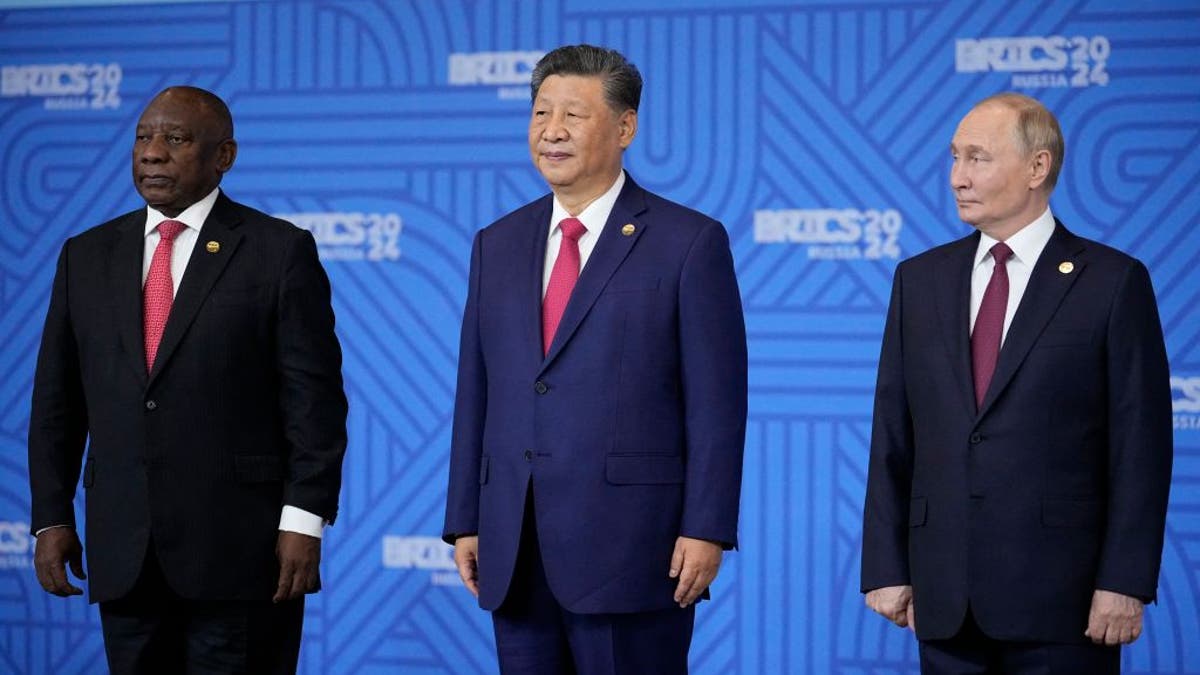
South African President Cyril Ramaphosa, Chinese President Xi Jinping and Russian President Vladimir Putin during the BRICS summit in Kazan on Oct. 23, 2024. (Alexander Zemlianichenko/Pool/AFP via Getty Images)
“Given the South African positions on the Russia-Ukraine and Mideast conflicts, South Africa is leaning away from American positions in a number of ways, most especially in its vigorous pursuit of Israel and its leaders in the international courts,” J. Brooks Spector told Fox News Digital.
Spector, a former U.S. diplomat now based in Johannesburg, and deputy editor of the respected Daily Maverick, added that “continuing action and rhetoric by South Africa in its pursuit of Israel in international court efforts will, however, encourage Republicans in Congress (and probably in the administration as well) to strip South Africa of benefits under the African Growth and Opportunity Act, assuming the act is renewed next year.”
BIDEN-HARRIS ADMIN ACCUSED OF ‘TOO LITTLE, TOO LATE’ TO SAVE THE PEOPLE OF WAR-TORN, FAMINE-STRICKEN SUDAN
“Such pursuits by the South African government may also lead to efforts to cut back on assistance to important efforts such as PEPFAR – the aid program that, together with the Global Fund and local organizations, has been crucial in the country’s successful efforts combatting HIV and AIDS.”
One such leading Republican, Sen. Jim Risch of Idaho, ranking member of the Senate Foreign Relations Committee, told Fox News Digital, “I remain concerned about South Africa’s efforts to cozy up to Russia, China and Iran, including Iran’s terror proxies, and the impact this has on U.S. national security – a vital element in AGOA eligibility. The country’s foreign policy actions will remain a focus of my oversight efforts.”
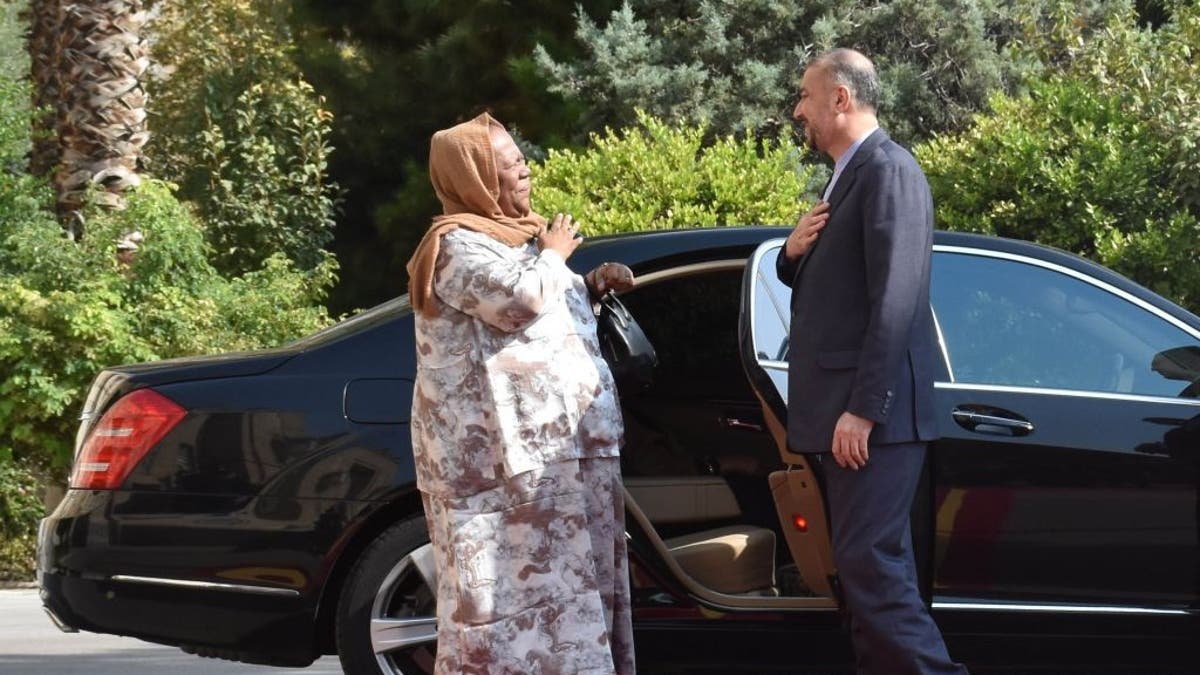
Naledi Pandor, minister of international relations and cooperation of South Africa, and Hossein Amir-Abdollahian, minister of foreign affairs of Iran, meet in Tehran on Oct. 22, 2023. (Haydar Sahin/Anadolu via Getty Images)
Sen. Tim Scott, R-S.C., ranking member of the Senate Foreign Relations Subcommittee on Africa and member of the Senate Finance Committee, slammed South Africa in 2023, “South Africa has harbored sanctioned Russian ships, expanded relations with Iran and issued statements against Israel’s right to defend itself following Hamas’ recent terror attacks”
Both of these influential Republican leaders are expected to become more powerful when President-elect Trump takes office in January, with Scott’s office staff telling Fox News Digital, “Sen. Scott looks forward to working with the Trump administration to ensure that AGOA participants are not undermining our national security interests.”

The now deceased Hamas leader Khaled Meshaal at a rally in his honor on Oct. 21, 2015, in Cape Town. South Africa. (Rodger Bosch/AFP via Getty Images)
South Africa’s moves are very definitely in an extremely bright spotlight in Washington. From inside the beltway, Richard Goldberg told Fox News Digital he’s worried particularly over potential links between South Africa and Iran. Goldberg is a former member of the National Security Council, and a senior adviser at the Foundation for Defense of Democracies. He told Fox, “The first step is to build the case publicly, and give South Africa one last moment of choosing. We should declassify intelligence about South Africa’s deep relationship with Iran, and any other support or partnership with terrorist groups.”
Goldberg continued, “And then we need to use our full diplomatic and economic weight to force Pretoria to choose between the United States and our terrorist adversaries. AGOA should be one of several items on the policy menu.”
South Africa’s Department of International Relations didn’t respond to several requests for comment. But COSATU’s Parliamentary Co-ordinator, Matthew Parks did. COSATU is the Confederation of South African Trade Unions, historically aligned with President Cyril Ramaphosa’s ANC party. Parks is highly respected for his meaningful and dignified pursuance of workers’ rights. His members have much to lose, including potentially their jobs, if South Africa is pushed out of AGOA. But he appeared to be cautiously optimistic when talking to Fox News Digital, “We are confident that our relations with the U.S. will continue to grow, including through AGOA, simply because it is to the benefit of both our peoples.”
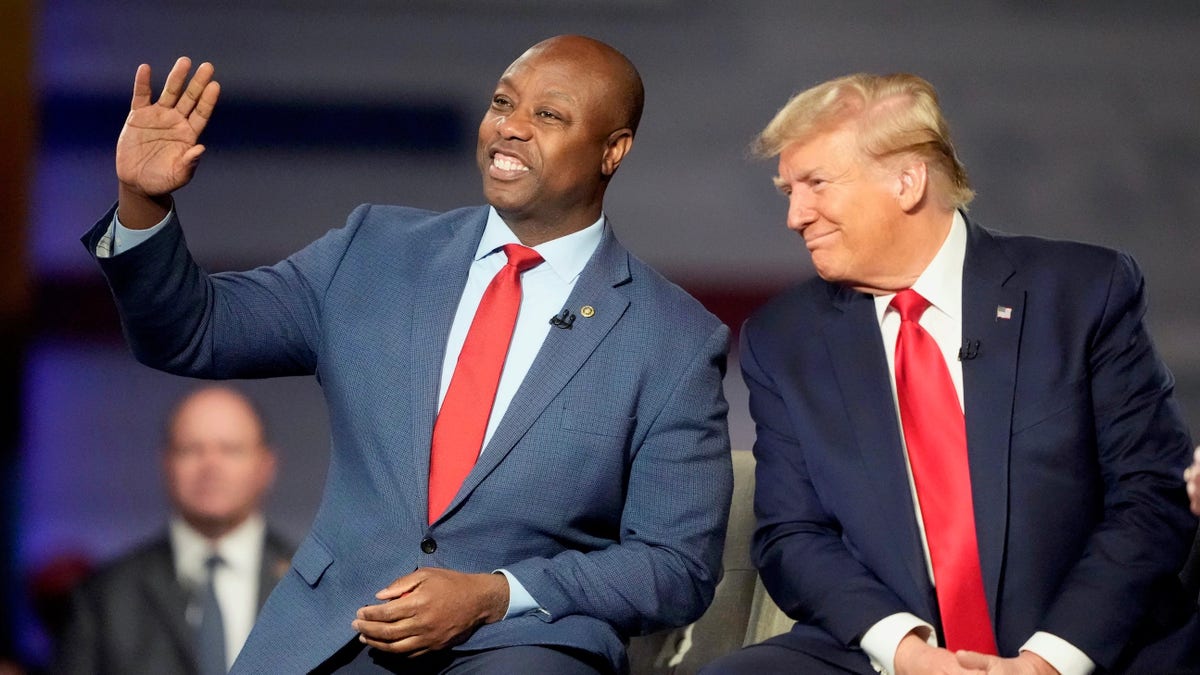
Sen. Tim Scott and former President Trump during a Fox News Channel town hall on Feb. 20, 2024, in Greenville, South Carolina. (AP Photo/Chris Carlson)
“We’ve been extensively involved in engagements between South Africa and the U.S., on how to deepen our relations and toward the renewal of AGOA,” Parks continued. “We’ve engaged extensively with our colleagues in the U.S. labor movement, business community, Congress (both Republicans and Democrats), the State Department, Department of Labor, NSC and the White House.”
As Trump moves into the White House, nearby Ebrahim Rassool will be starting his second term as South African ambassador to the U.S. This month he talked to the Daily Maverick on South Africa’s challenges with the new administration, referring to South Africa’s attack on Israel at the ICJ. “We will stick by the case, but let us now trust our legal team,” he said, “trust the evidence that we have placed in front of the judges of the ICJ, trust the judges of the ICJ to come to a sustainable, just solution – but that we need to put away the megaphone now.”
THOUSANDS OF CHRISTIANS ‘DELIBERATELY TARGETED’ AND KILLED IN NIGERIA, NEW REPORT SAYS
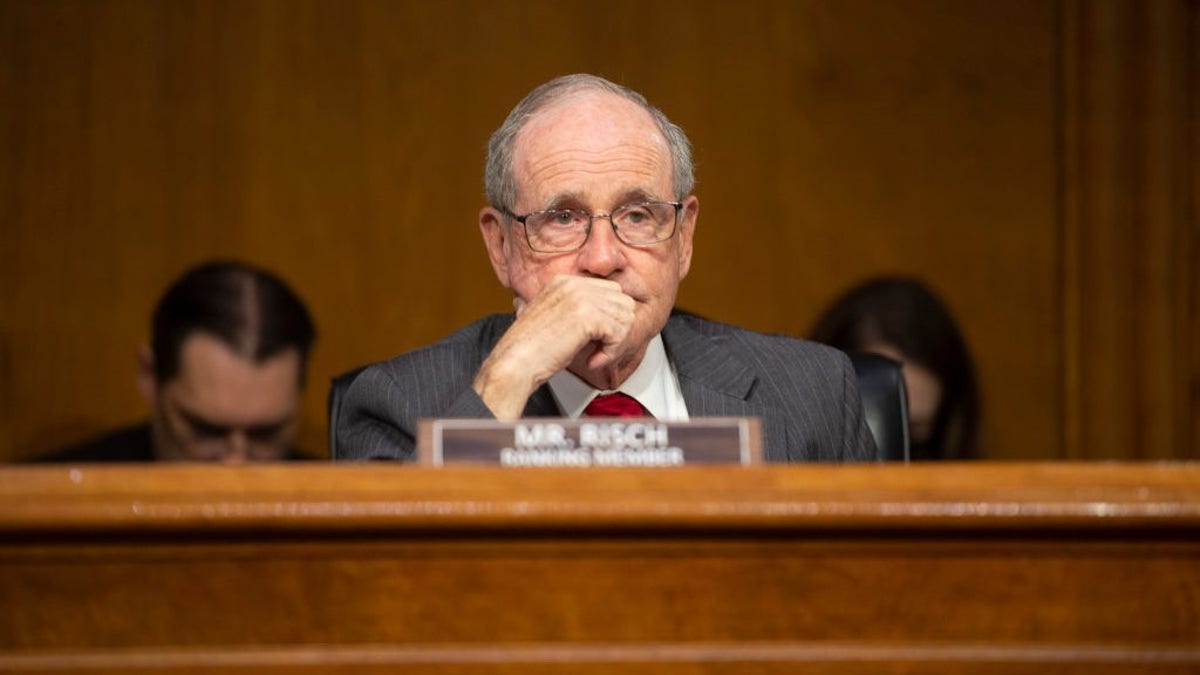
Sen. Jim Risch during a Senate Foreign Relations Committee hearing at the U.S. Capitol on April 26, 2022. (Bonnie Cash-Pool/Getty Images)
Rassool pointed out that the South African oranges exported to the U.S. under AGOA enabled Americans to drink orange juice all year round, when Florida and California oranges were out of season.
And Rassool added, “Why would you want to punish America with expensive cars when the BMWs coming from South Africa are going to be much cheaper than getting them from Germany or manufacturing your own?
“Likewise, to point out that American cancer patients are receiving medical nuclear isotopes that come from South Africa.”
The expulsion of South Africa from AGOA would be “disastrous,” Renai Moothilal wrote in the Business Day newspaper last year. Moothilal is CEO of the National Association of Automotive Component & Allied Manufacturers, and wrote, “It will be no surprise if some component manufacturers close their doors. U.S.-headquartered multinational manufacturers with plants here may exit the South African country if there are volume losses linked to our exclusion from AGOA, or other forms of political pressure are brought to bear.”
Observers note there are loud threats coming from President-elect Trump himself, including a claim that he will slap a 100% import tariff on countries like South Africa if, as members of BRICS, they adopt a new currency to rival the dollar. In the other corner of the ring, South African politicians are taking a more placatory and reserved tone. The Democratic Alliance or DA is South Africa’s main opposition party. But since May, they have also been members of the government of national unity, working in a sometimes noisy coalition with President Ramaphosa’s ANC.

The Russian frigate Admiral Gorshkov docked in the Cape Town harbor, Feb. 14, 2023, en route to naval exercises with the South African and Chinese Navy. (AP Photo/Nardus Engelbrecht)
Emma Powell, the DA’s national spokesperson for foreign affairs, told Fox News Digital that it’s likely the relationship between Pretoria and Washington “will become increasingly transactional, with greater emphasis placed on equitable reciprocity. This would contrast the Biden administration’s approach to beneficiation-based investment and development. There is also likely to be less tolerance for any action on the part of the South African government that may be perceived as undermining the national security interests of the United States.”
Powell added “the Trump administration is also likely to take a more cautious approach on AGOA eligibility.”
J. Brooks Spector told Fox News Digital he could take home one strong positive: “The incoming U.S. president’s often-expressed support for transactional foreign economic policies may possibly be an incentive for Africa’s nations – urged on by South Africa – to come together with initiatives offering trade and market concessions in Africa to America.”
World
2024: Top 10 defining moments in the European Parliament

From crucial votes on nature and migration, to powerful speeches and hard debates: the year saw drama and upheaval in the Eurochamber
2024 was a year of change for the European Parliament, shaken up by the elections in July.
Beyond the vote, which significantly modified its composition and balance of powers, here are some moments to remember from this year.
1. Farmers’ protests reach Parliament
The beginning of 2025 was marked by massive protests of farmers across Europe, from Germany and France to Poland and Spain.
Among their targets were the EU’s commercial deal with Mercosur countries – at that time negotiations were still ongoing – and some European environmental policies affecting the agrifood sector.
On 1 February, a thousand farmers from several countries arrived in Brussels. After a night procession on their tractors, they occupied the square in front of the European Parliament for an entire day, burning hay, spreading manure and damaging the square.
2. ‘Stop being boring to defeat Putin’
One of the most powerful and evocative interventions in the European Parliament was Yulia Navalnaya’s in February. She took the floor in the hemicycle in Strasbourg days after her husband, Alexei Navalny, died under suspicious circumstances while imprisoned in Russia.
Navalnaya paid tribute to the opposition leader’s courage and attacked Russia’s president Vladimir Putin, receiving a general standing ovation from MEPs.
“If you really want to defeat Putin, you have to become an innovator. You have to stop being boring,” Navalnaya told MEPs.
“You cannot defeat him by thinking he is a man of principle who has morals and rules. He is not like that. And Alexei realised that a long time ago. You are not dealing with a politician but with a bloody monster.”
3. The final battle on Nature Restoration Law
The Nature Restoration Law, a proposal to gradually rehabilitate the EU’s land and sea areas degraded by climate change and human activity was one of the most contentious issues in the European Parliament in the final part of the legislature.
European People’s Party (EPP) began a full-throttle campaign to bring down the law, arguing it would imperil food production, increase retail prices and devastate the traditional livelihoods of farmers.
EPP talking points were backed by right-wing forces, but fully contested by progressive MEPs, environmental organisations, legal scholars and even multinationals, who said restoring nature was indispensable to maintain a prosperous economy and sustainable supply chains.
The EPP even pressed on with a controversial social media push, going as far as claiming the legislation would turn the city of Rovaniemi, where Santa Claus lives, into a forest.
In February, the Parliament eventually approved a watered-down version of the law with 329 votes in favour and 275 against. It entails the restoration of at least 20% of the EU’s land and sea areas by 2030, and of all ecosystems in need by 2050.
4. The long-sought vote on the major migration policy reform
In April 2024, the European Parliament approved the wide-reaching reform of the European Union’s migration and asylum policy almost four years after the European Commission had proposed it.
The “Pact on migration and asylum” was supported by the three major Parliament groups: European People’s Party (EPP), Socialists and Democrats (S&D), and Renew Europe, albeit with some dissidents.
The right-wing parties, the Greens/EFA and the Left group voted against. The latter even protested outside Parliament before the vote, staging a “funeral for the right to asylum” that it claimed the new rules would usher in.
New rules foresee a solidarity mechanism to share the burdens of welcoming asylum seekers, through a redistribution among the member states which can be replaced with financial contributions. But they also entail stricter border controls and faster procedures for examining asylum requests and carrying out the repatriation of migrants. The Pact will be fully in force from mid-2026.
5. The Parliament backs abortion as an EU fundamental right
Even symbolic votes could cause hard clashes in the European Parliament. In April, the Chamber approved a resolution to include the right to abortion in the Charter of Fundamental Rights of the European Union.
As the topic is very divisive, the Parliament split. The resolution was approved with 336 votes in favour, 163 against, and 39 abstentions. The right-wing groups Identity and Democracy and European Conservatives and Reformists voted against, as did the majority of the centre-right conservative European People’s Party, the largest group of the Parliament.
However, the vote did not have a binding effect. The Charter of Fundamental Rights of the EU requires the unanimous agreement of all member states to be changed. The rules for terminating pregnancy also fall within health legislation, which is the exclusive competence of EU countries.
6. The final rush before the European elections
Members of the European Parliament often run to the last available moment to approve important pieces of legislation. In its last session before the elections, the EP held 89 votes on legislative files, plus seven non-legislative resolutions, marking a record for the entire legislature.
Among them, there were the right-to-repair directive, a regulation to prohibit products made with forced labour on the Union market, new rules for digital platform workers, a bill on packaging reduction, and the first-ever European law against gender-based violence.
7. The ‘Venezuela majority’ in Europe
After the vote, the new European Parliament soon revealed its changed balance of powers, even if in a mostly symbolic vote. In September, the Strasbourg hemicycle voted to recognise Venezuela’s exiled presidential candidate Edmundo González Urrutia as the “legitimate and democratically elected president”.
The resolution, which carried no legal weight, was backed by the centre-right European People’s Party (EPP), the right-wing nationalist European Conservatives and Reformists (ECR) and the newly formed far-right Patriots for Europe, marking the first time in the new legislature that mainstream conservatives joined ranks with the more right-wing groups.
This alliance was renamed the “Venezuela majority”, following the subject of the vote, and resurfaced during the decision to award González and Venezuela’s opposition leader María Corina Machado the Parliament’s Sakharov Prize for Freedom of Thought.
8. Von der Leyen vs Orbán: showdown in the Parliament
The first October plenary session saw a fiery debate pitching European Commission President Ursula von der Leyen against Hungary’s prime minister Viktor Orbán, who took the stage in the European Parliament a few months after a controversial visit to Moscow made while Hungary occupied the rotating presidency of the Council of the EU.
The war in Ukraine was one of the bones of contention, with the Hungarian leader claiming that the EU had adopted a mistaken policy on the war and the Commission president launching a personal attack on him without mentioning his name: “There are still some who blame this war not on the invader but on the invaded.”
9. The unpopular approval of the European Commission
At the end of November, the European Parliament definitively approved the College of Commissioners led by Ursula von der Leyen. But while the vote on the Commission’s President herself in July was a success for von der Leyen, she could barely celebrate the approval of the College.
In November, only 370 MEPs voted in favour, representing 54% of all votes cast and 51% of the total number of members, 719.
Several defections came from among the centre-right European People’s Party, the centre-left Socialists and Democrats and the liberal Renew Europe, lowering support for the Commission, which was “saved” by the votes of part of the European Conservatives and Reformists and the Greens/EFA group.
Indeed, for one reason or another, only one in two lawmakers has endorsed the new College of Commissioners.
10. Weirdness and oddities in the Eurochamber
2024 also witnessed some surreal moments during the debates in the Parliament: a dog barking in the hemicycle, an Irish MEP insulting an Italian football club, and a Slovak MEP releasing a dove as a gesture of peace.
-
/cdn.vox-cdn.com/uploads/chorus_asset/file/24924653/236780_Google_AntiTrust_Trial_Custom_Art_CVirginia__0003_1.png)
/cdn.vox-cdn.com/uploads/chorus_asset/file/24924653/236780_Google_AntiTrust_Trial_Custom_Art_CVirginia__0003_1.png) Technology5 days ago
Technology5 days agoGoogle’s counteroffer to the government trying to break it up is unbundling Android apps
-

 News6 days ago
News6 days agoNovo Nordisk shares tumble as weight-loss drug trial data disappoints
-

 Politics6 days ago
Politics6 days agoIllegal immigrant sexually abused child in the U.S. after being removed from the country five times
-

 Entertainment7 days ago
Entertainment7 days ago'It's a little holiday gift': Inside the Weeknd's free Santa Monica show for his biggest fans
-

 Lifestyle6 days ago
Lifestyle6 days agoThink you can't dance? Get up and try these tips in our comic. We dare you!
-

 Technology1 week ago
Technology1 week agoFox News AI Newsletter: OpenAI responds to Elon Musk's lawsuit
-
/cdn.vox-cdn.com/uploads/chorus_asset/file/25672934/Metaphor_Key_Art_Horizontal.png)
/cdn.vox-cdn.com/uploads/chorus_asset/file/25672934/Metaphor_Key_Art_Horizontal.png) Technology2 days ago
Technology2 days agoThere’s a reason Metaphor: ReFantanzio’s battle music sounds as cool as it does
-

 News3 days ago
News3 days agoFrance’s new premier selects Eric Lombard as finance minister
















